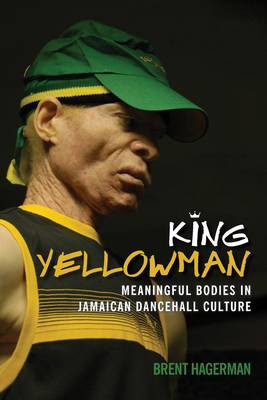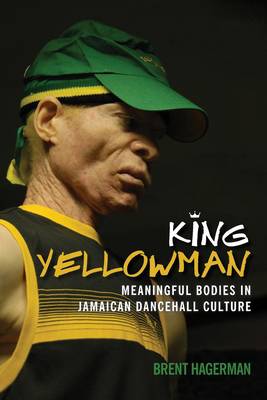
- Retrait gratuit dans votre magasin Club
- 7.000.000 titres dans notre catalogue
- Payer en toute sécurité
- Toujours un magasin près de chez vous
- Retrait gratuit dans votre magasin Club
- 7.000.0000 titres dans notre catalogue
- Payer en toute sécurité
- Toujours un magasin près de chez vous
Description
Jamaican deejay
Yellowman divided a country with his bawdy songs and his very body: he has been
wildly popular among dancehall fans, yet widely despised by polite society. Even
though his contribution to Jamaican musical culture is immense, scholars have
ignored him and reggae histories have largely misunderstood him.
King Yellowman: Meaningful
Bodies in Jamaican Dancehall Culture is the first serious study of one Jamaica's most significant artists
and dancehall's first major international star. It is a critical biography designed
to satisfy fans while furthering academic discourse on dancehall by offering a
new perspective on the way Yellowman negotiates the slackness/culture binary in
Jamaican music.
Based on years of ethnographic
fieldwork, Brent Hagerman begins with the compelling story of Winston Foster's
early life as an abandoned ghetto outcast and his hard-fought journey to become
the King of Dancehall, then goes on to a critical exploration of the
marginalization of people with albinism in Jamaica and the use of slackness in
Caribbean music. Through slackness and his mobilization of Rastafarian symbols,
Yellowman subverts embedded Jamaican cultural notions of sexuality, gender, and
race to overcome his cultural displacement, promote his yellow body as sexually
appealing and forge a place for himself among the Jamaican body politic.
Yellowman divided a country with his bawdy songs and his very body: he has been
wildly popular among dancehall fans, yet widely despised by polite society. Even
though his contribution to Jamaican musical culture is immense, scholars have
ignored him and reggae histories have largely misunderstood him.
King Yellowman: Meaningful
Bodies in Jamaican Dancehall Culture is the first serious study of one Jamaica's most significant artists
and dancehall's first major international star. It is a critical biography designed
to satisfy fans while furthering academic discourse on dancehall by offering a
new perspective on the way Yellowman negotiates the slackness/culture binary in
Jamaican music.
Based on years of ethnographic
fieldwork, Brent Hagerman begins with the compelling story of Winston Foster's
early life as an abandoned ghetto outcast and his hard-fought journey to become
the King of Dancehall, then goes on to a critical exploration of the
marginalization of people with albinism in Jamaica and the use of slackness in
Caribbean music. Through slackness and his mobilization of Rastafarian symbols,
Yellowman subverts embedded Jamaican cultural notions of sexuality, gender, and
race to overcome his cultural displacement, promote his yellow body as sexually
appealing and forge a place for himself among the Jamaican body politic.
Spécifications
Parties prenantes
- Auteur(s) :
- Editeur:
Contenu
- Nombre de pages :
- 396
- Langue:
- Anglais
- Collection :
Caractéristiques
- EAN:
- 9789766408510
- Date de parution :
- 22-09-21
- Format:
- Livre broché
- Format numérique:
- Trade paperback (VS)
- Dimensions :
- 152 mm x 229 mm
- Poids :
- 580 g

Les avis
Nous publions uniquement les avis qui respectent les conditions requises. Consultez nos conditions pour les avis.






